The Best AI Research Assistants (in 2026)
We tested 93 AI research assistants, and these are the best tools to find, understand and cite academic papers.
Combing through endless academic papers and managing mountains of research notes devours precious time that could be spent on actual analysis and writing. Between reading dense articles, organizing citations, and trying to stay current with new publications, researchers and students often find themselves buried in administrative tasks rather than focused on generating insights.
After testing dozens of AI research assistants over the past month, we've identified the most capable tools that genuinely streamline academic workflows in 2025.
Quick look: The 8 best AI Research Assistants
 Perplexity AI Best for querying web sourcesSee Tool
Perplexity AI Best for querying web sourcesSee Tool- Paperguide Best for integrating research tasksSee Tool
 Paper Digest Best for digesting academic papersSee Tool
Paper Digest Best for digesting academic papersSee Tool
What makes the best AI Research Assistants?
Here's what we evaluated when selecting the most capable AI research assistants:
- Accuracy: The AI must reliably understand complex academic content and generate factually correct insights. Smart citation analysis, accurate paper summaries, and high-quality writing suggestions demonstrate mastery of scholarly material.
- Research Integration: Leading tools seamlessly connect with essential research workflows. Deep integration with reference management, PDF libraries, and academic databases makes organizing and citing sources effortless.
- Knowledge Management: Superior research assistants excel at organizing vast amounts of academic content. Clear search capabilities, intelligent tagging systems, and powerful filters help researchers navigate their growing knowledge base.
- Collaboration: The best platforms support team-based research through shared libraries, collaborative writing, and group annotation features. Real-time updates and granular access controls facilitate smooth cooperation between colleagues.
The best AI Research Assistants at a glance
| Tool | Best For | Standout Features | Pricing |
|---|---|---|---|
| Perplexity AI | Querying Web Sources | Cited answers from web search. | Free tier; Pro plan ~$20/month. |
| Upword | Streamlining Reading Workflows | Integrated reading-to-notes workflow. | Free basic plan; Pro $19/month. |
| Scite | Evaluating Paper Credibility | Analyzes citation context for credibility. | Offers free tier; paid plans required. |
| SciSpace | Decoding Research Papers | Explains complex technical content. | Offers free tier and premium plans. |
| Yomu | Crafting Scholarly Text | AI writing with citation finding. | Free plan; paid starts ~$9/month. |
| Paperguide | Integrating Research Tasks | All-in-one research workflow integration. | Free tier available; paid plans unlock features. |
| Paper Digest | Digesting Academic Papers | Daily summaries of new papers. | Free basic access; subscriptions required. |
| Sourcely | Finding Credible Sources | Matches sources to your text. | Offers free plan with limitations. |
Best AI Research Assistant for Decoding Research Papers
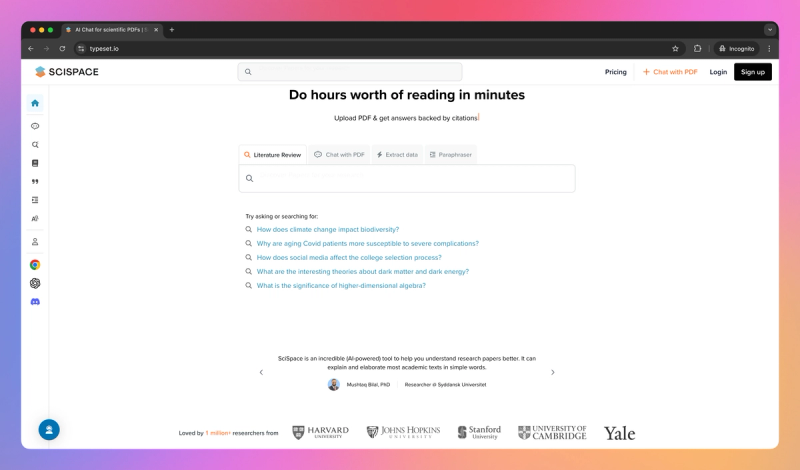
SciSpace
SciSpace positions itself as a comprehensive “AI Copilot” for scientific research, helping you decode complex papers with ease. It uniquely combines a massive database of over 200 million academic articles with an AI capable of explaining technical content like text, math, and tables in plain language. This dual capability makes the platform a one-stop solution for both discovering and deeply understanding scholarly literature. You can search millions of papers, upload your own, or chat directly with documents to get instant explanations, summaries, and citation-backed answers, significantly aiding literature reviews and idea generation.
Pros:
- Holistic Research Tool: Combines search, reading, and writing assistance in one platform, streamlining the entire research workflow from discovery to drafting without needing multiple apps.
- Dramatic Time Savings: Instantly summarizes sections, explains complex concepts, and provides citation-backed answers, drastically cutting down the time required to digest dense research papers.
- Improved Understanding: Excels at simplifying complex academic language, formulas, and jargon, making challenging papers more accessible and enhancing comprehension, especially for interdisciplinary work.
Cons:
- Premium Features Cost: While a free tier exists, accessing advanced features like unlimited AI interactions requires a paid subscription, which can be costly for students or those on tight budgets.
- Potential AI Inaccuracies: Like any AI, its explanations or summaries require verification; outputs should be critically evaluated and cross-referenced with the original paper, especially for crucial details.
- Initial Interface Complexity: The feature-rich interface, while powerful, can feel cluttered or overwhelming to new arrivals, requiring some time to master all capabilities effectively.
- Dependent on Input Quality: Performance relies heavily on well-structured, clean PDFs; poorly scanned documents or unusual formatting may hinder the AI's ability to parse content accurately.
Best Use Cases:
- Accelerating Literature Reviews: Quickly gather relevant papers, generate summaries, extract key findings, and identify connections or contradictions across multiple studies.
- Decoding Complex Papers: Ideal for tackling dense or technical articles, using the AI Copilot to explain difficult sections, terminology, math, or figures on the fly.
- Supporting Scholarly Writing: Useful for fact-checking claims against literature, finding supporting citations with context, and ensuring your work integrates well with existing research.
Best AI Research Assistant for Querying Web Sources
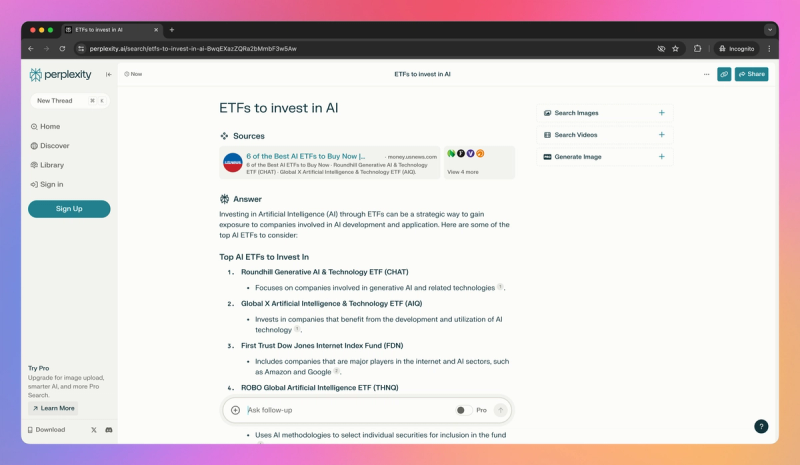
Perplexity AI
Perplexity AI is often hailed as a powerful alternative to traditional search engines for researchers. It serves as an AI search assistant that delivers direct answers to queries by searching the open internet and literature – complete with inline citations for each fact. Perplexity’s differentiator is its ability to break down complex questions into sub-queries automatically, fetch information from multiple sources, and synthesize an answer in seconds. For academics, this means instead of manually sifting through dozens of search results, this tool provides a concise, sourced summary.
Pros:
- Lightning-Fast Research: Get direct answers in one go, rather than having to visit multiple links, significantly speeding up the initial information gathering phase.
- Cited and Trustworthy Sources: Build confidence in answers with clear source citations accompanying each statement, allowing for easy verification and upholding academic integrity.
- Up-to-Date Knowledge: Access the latest information available online, as it performs live web searches for every query, ensuring answers are current.
Cons:
- Fact-Checking Required: While generally accurate, outputs still require verification against original sources, especially for critical or high-stakes research, as inaccuracies can occur.
- Limited Answer Depth: Default answers are concise and may lack the depth needed for highly complex or nuanced research questions, requiring further probing or source review.
- Subscription for Full Use: The free version has limitations; accessing the most advanced features, longer conversational memory, and unlimited queries requires a paid Pro subscription.
Best Use Cases:
- Research brainstorming: Quickly explore new topics, map out the existing landscape, and identify key subtopics or debates with sourced starting points.
- Rapid fact-checking: Instantly verify statistics, dates, or specific claims during the writing process, complete with source confirmation.
- Study support: Efficiently summarize key points from materials or generate relevant questions to aid learning and exam preparation.
Best AI Research Assistant for Evaluating Paper Credibility
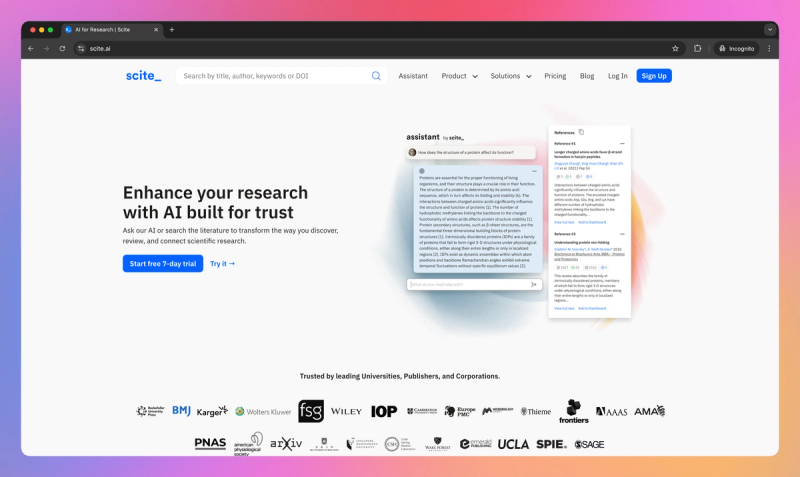
Scite
Scite is an AI-powered platform focused on understanding how academic papers are cited by others. Its innovative 'Smart Citations' system qualitatively analyzes citation contexts, showing whether subsequent papers support or contradict findings, addressing the crucial need to evaluate research reliability and impact. By using deep learning to read citation sentences, Scite transforms the vast web of citations into a navigable map, helping you quickly gauge consensus or dissent around a topic. This platform acts as an AI literature analyst, setting it apart from traditional databases by focusing on citation sentiments (supporting, contrasting, or mentioning) at scale.
Pros:
- Enhances Research Rigor: Scite adds a crucial layer by focusing on evidence quality, not just citation counts. You gain context, learning if a report has been supported or contradicted, which helps avoid citing papers at face value and strengthens your work's credibility.
- Saves Literature Evaluation Time: Instead of reading dozens of citing papers to understand the scholarly conversation, Scite summarizes the support or controversy around a specific study. This significantly speeds up evaluating sources, especially during systematic reviews, letting you focus deep reading on the most impactful work.
- Accessible Citation Insights: Despite handling complex citation data, the interface presents information clearly with dashboards and visual cues. Integrations with browsers and reference managers bring these insights directly into your existing workflow, making it easy to access citation context without switching tools.
- Promotes Critical Thinking: By revealing the context and sentiment behind citations, Scite encourages a more critical approach to the literature. It helps you move beyond simple citation counts and understand the ongoing scholarly dialogue, leading to more thoughtful and nuanced academic writing.
Cons:
- Subscription Cost: While offering limited free searches, unlocking Scite's full potential requires a subscription, which can be a significant cost, particularly for individual students or researchers without institutional access.
- Initial Learning Curve: The sheer amount of data and features presented in the reports can feel overwhelming at first. Learning to effectively interpret the metrics and navigate all functionalities requires some initial time investment.
- Coverage Limitations: The database, while large, may have gaps, especially for very niche fields, extremely recent publications, or non-English language papers. You might find less comprehensive citation data for certain articles.
- Requires Critical Reading: The citation analysis is a powerful guide but doesn't replace the need to read the source papers. Relying solely on the 'support' or 'contrast' labels without understanding the specific context can sometimes be misleading.
Best Use Cases
- Writing Literature Reviews and Introductions: Use Scite to accurately state the existing consensus or debate around topics by verifying how prior studies have been supported or contested in subsequent literature.
- Validating Research Credibility: Assess the reliability of specific papers or findings for grant proposals, dissertations, or systematic reviews by quickly seeing the volume and nature (supporting vs. contrasting) of citations.
- Assisting Peer Review: Quickly check if a manuscript's cited references genuinely support the claims being made, ensuring authors are accurately representing the literature they build upon.
Best AI Research Assistant for Integrating Research Tasks
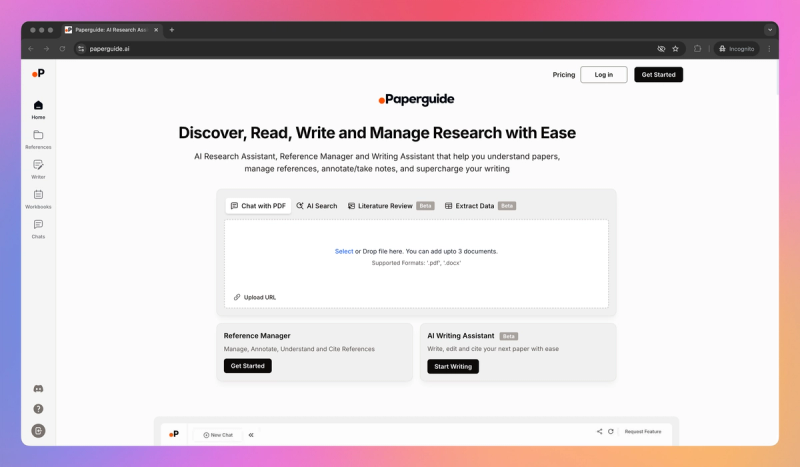
Paperguide
Paperguide serves as an all-in-one AI research assistant specifically designed to streamline your entire academic research process within a single platform. It integrates literature search and analysis, robust reference management, and AI-powered writing assistance, effectively acting as a combined super-smart reference manager and writing aide. The aim is to provide a unified workspace for research, reducing the need to juggle multiple applications like PDF readers, reference managers, and writing tools. This platform was explicitly built to make the often challenging literature review process significantly easier by centralizing tasks and leveraging AI.
Pros:
- Complete Workflow: It genuinely supports the entire research journey, from finding papers right through to writing the final draft, all within one connected environment, which really cuts down on switching between different tools.
- Major Time Saver: Automating tasks like summarizing papers and suggesting citations significantly speeds up the literature review and writing process, freeing up valuable time that would otherwise be spent on manual reading and formatting.
- Better Organization: Having a single, organized place for all your sources, notes, and drafts, along with features like the literature table and efficient reference management, makes large projects much more manageable, especially for collaborative teams.
Cons:
- AI Accuracy Check Needed: While helpful, the AI's summaries and writing suggestions aren't perfect and require careful review to ensure they accurately reflect the source material and fit your specific argument.
- Limited Citation Styles: You might find the available citation formats somewhat restrictive if your field or journal requires a less common style, potentially requiring manual adjustments later.
- Requires Internet Access: As a cloud-based platform, you need a stable internet connection to use it, which can be a limitation if you often work offline or in locations with poor connectivity.
Best Use Cases:
- Large Literature Reviews: Ideal when you need to manage, summarize, and synthesize a large number of papers, such as for a PhD literature review chapter or a comprehensive research proposal.
- Writing Major Academic Documents: Streamlines the writing of theses, dissertations, or substantial research papers by integrating source management, AI-assisted drafting, and citation handling.
- Collaborative Research: Facilitates teamwork by providing a shared space for literature collection, note-taking, and co-writing, ensuring everyone stays aligned on the project.
Best AI Research Assistant for Streamlining Reading Workflows
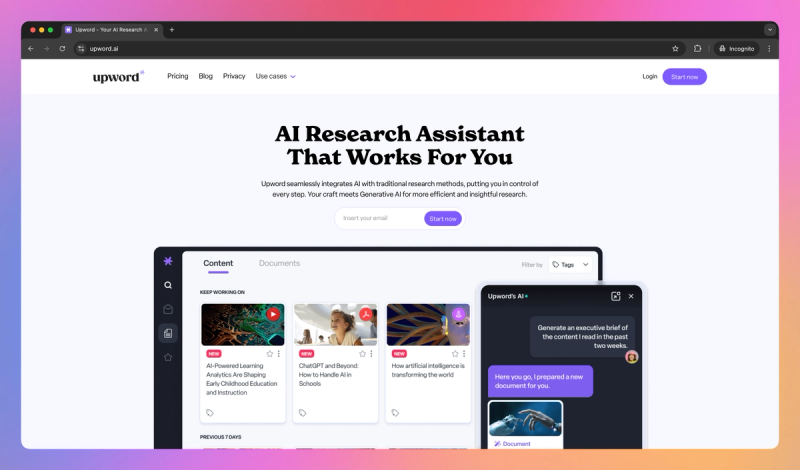
Upword
Upword is primarily focused on summarizing and organizing information, turning large volumes of text like articles, reports, or chapters into concise summaries and notes. It provides an entire workflow for processing readings: you can highlight important points, generate summaries, collaborate on notes, and export the results. This tool helps you move from reading to understanding to note-taking in one integrated process. Its AI is tuned to extract information effectively, mimicking human highlighting patterns, and combines summarization with features like a browser extension and personalized project folders to streamline reviewing literature or any lengthy content.
Pros:
- Speeds Up Reading: Automating the heavy lifting of reading allows you to cover significantly more material in less time, condensing hours of reading into minutes of skimming key points.
- Easy to Use: The tool is straightforward to set up and use, especially the browser plugin. The interface is clear, requiring minimal technical expertise to start generating summaries quickly.
- Quality Summaries: The AI generates coherent summaries that often capture the same points a human reader would highlight, maintaining important context. You can also fine-tune or edit the AI output to ensure it meets specific needs.
- Excellent Organization: Beyond summarizing, it helps organize knowledge into searchable project dashboards, creating a valuable archive of summarized literature far more useful than scattered PDFs.
Cons:
- Subscription Required for Full Use: While a free basic plan exists, unlimited usage and advanced features require a paid subscription, which might be a constraint for those on a tight budget.
- Risk of Superficial Understanding: Relying solely on summaries might lead to missing nuances or developing a 'skim-only' habit, potentially hindering deep comprehension required for some research.
- Potential AI Inaccuracies: Like any summarizer, it can occasionally misinterpret complex text or omit critical details, requiring you to cross-check key facts against the original source.
- Focus on Summarization, Not Analysis: It excels at organizing existing content but doesn't perform deep analysis, generate novel insights, or replace the intellectual work of synthesizing information into a narrative.
Best Use Cases:
- Digesting Readings: Ideal for summarizing numerous articles for a literature review or quickly getting through extensive reading assignments.
- Exam Preparation: Condense lecture notes, textbook chapters, and articles into study guides or flashcards.
- Staying Current: Quickly summarize the latest journal issues or conference proceedings to keep abreast of developments in your field.
Best AI Research Assistant for Crafting Scholarly Text
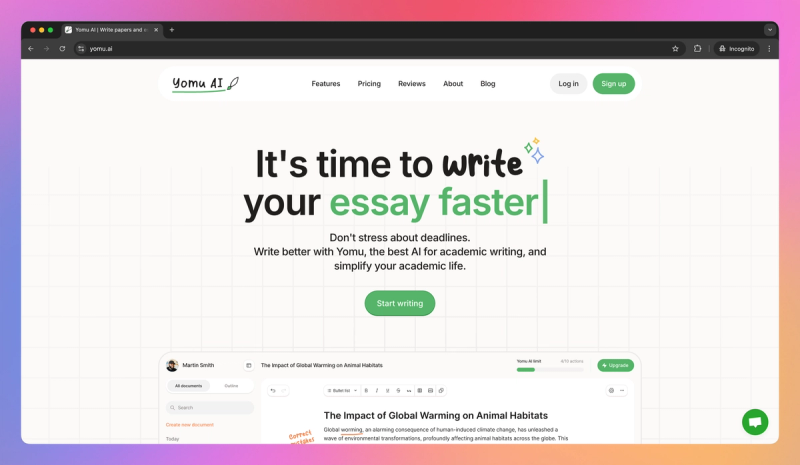
Yomu
Yomu is an AI writing assistant designed specifically for academic writing and research, operating within your writing process to help craft well-structured, well-supported scholarly text. Unlike generic writing tools, it understands academic context, suggesting sentence completions, finding relevant citations, and ensuring your writing meets formal standards while supporting over 30 languages. This combination of writing AI and citation intelligence in one tool, along with robust proofreading and paraphrasing tailored to academic tone, differentiates it as an AI co-author that actively improves your paper as you draft, integrating reference management directly into the writing phase.
Pros:
- Seamless Citations: Effortlessly handle citations as you write. The tool inserts and formats references perfectly, building your bibliography automatically and reducing errors associated with manual citation management.
- Writing Quality Boost: Improve the clarity and academic tone of your writing. The proofreading catches grammar and style issues specific to research contexts, while suggestions help ensure arguments are well-supported and language meets scholarly standards.
- Multilingual Flexibility: Write effectively regardless of your primary language. Support for over 30 languages means you can draft in your native tongue and get assistance translating it into polished academic English, or vice versa.
Cons:
- AI Inaccuracy: The AI-generated text suggestions can sometimes be generic, irrelevant, or slightly inaccurate, requiring careful vetting and oversight to ensure content quality and relevance.
- Restricted Free Access: While a free plan exists, its AI features (like citation suggestions and auto-completion) are reportedly very limited, pushing you towards a paid subscription for meaningful use.
- Learning Curve & Dependency: Relying heavily on the tool might hinder the development of your own writing and research skills, and learning to prompt the AI effectively takes some initial effort.
Best Use Cases:
- Drafting Papers & Theses: Use it to generate outlines, elaborate on sections with appropriately phrased academic content, and automatically include citations, significantly speeding up the creation of first drafts for essays, papers, or dissertations.
- Supporting Multilingual Writers: Leverage the translation and refinement features to produce publication-ready English text, overcoming language barriers for non-native speakers writing scholarly articles.
Best AI Research Assistant for Digesting Academic Papers
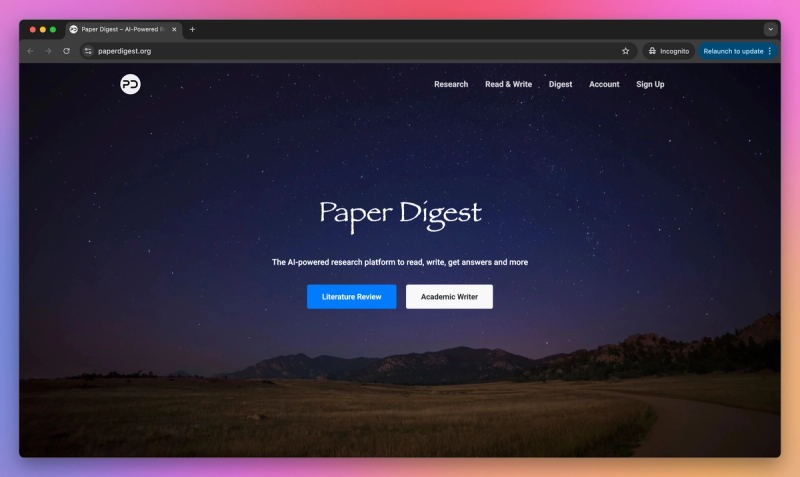
Paper Digest
Paper Digest is an AI-driven tool designed to summarize academic research papers and keep you up-to-date. It excels at taking lengthy scholarly articles and distilling them into essential points, acting like an automated executive summary for scientific work. This capability is particularly valuable if you need to stay current with literature without reading every paper in full. This tool focuses specifically on the academic domain, recognizing research article structures to extract objectives, findings, and conclusions, while its unique Daily Paper Digest feature also offers a literature monitoring service by tracking and summarizing new papers daily based on your specified topics or authors.
Pros:
- Accelerated Literature Surveys: Paper Digest significantly reduces the time needed to grasp insights from papers, allowing you to cover more ground and focus deep reading on only the most relevant articles identified by its summaries.
- Effortless Literature Monitoring: The daily digest feature helps you stay current with new publications in your field without feeling overwhelmed, delivering concise summaries of fresh research directly to you based on your interests.
- Simplified Explanations: The tool excels at explaining complex papers in more straightforward language, making dense academic content more accessible when exploring interdisciplinary research or new fields.
- Literature Review Assistance: The copilot feature provides a starting point for literature reviews by summarizing and potentially synthesizing themes across multiple papers, saving significant writing time.
Cons:
- Potential Nuance Loss: As summaries condense information, you might miss subtle details, study limitations, or secondary findings present in the full paper; relying solely on the digest carries this risk.
- Variable Summary Quality: The effectiveness of summaries can depend on the paper's complexity and structure; some dense or unconventionally formatted articles may yield less insightful or generic digests.
- Limited Free Access: While a basic version is available, advanced features like daily alerts or extensive usage likely require a paid subscription, which might be a constraint if you have budget limitations.
Best Use Cases
- Quickly triaging large numbers of papers during the initial phase of a research project or systematic review to identify relevant articles for deeper reading.
- Maintaining current awareness in fast-moving fields by using the daily digest feature to monitor new publications without manual scanning of journals or archives.
- Drafting introduction or related work sections by leveraging the literature review copilot to generate initial comparative summaries of key papers.
Best AI Research Assistant for Finding Credible Sources
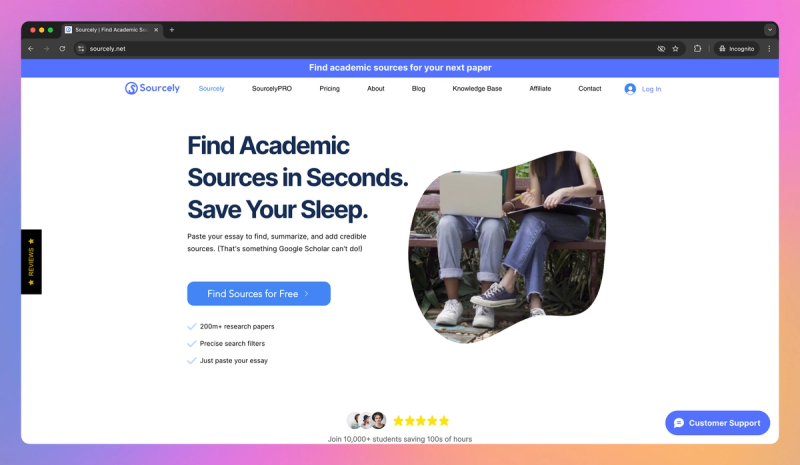
Sourcely
Sourcely is designed to help you find credible academic sources quickly to support your work, addressing the common pain point of locating references after drafting. It analyzes your written text—an essay or draft—and automatically searches research databases for relevant sources that match the content, acting like a smart reference librarian reading what you have and suggesting citations. This tool emphasizes finding high-quality, reliable sources, differentiating it from generic web searches by focusing on peer-reviewed or authoritative materials. This context-driven approach aims to provide precise matches and streamline the process of backing up your claims with scholarly evidence.
Pros:
- Significant Time Saver: Sourcely dramatically cuts down the time spent hunting for sources, generating suggestions in seconds that might otherwise take hours to compile manually.
- Improved Credibility: By providing real, citable academic references relevant to your text, the tool helps elevate the quality and trustworthiness of your writing.
- Efficient Referencing: It helps organize the sources it finds and provides easy ways to cite them, streamlining the bibliography creation process and ensuring consistency.
Cons:
- Accuracy Requires Vetting: You'll need to verify the relevance and accuracy of the AI's suggestions, as it might occasionally misinterpret text or miss crucial nuances.
- Source Quality Varies: While aiming for reliability, the tool might suggest older sources, paywalled content you can't access, or miss materials not available in its indexed online databases.
- Potential Learning Crutch: Over-reliance might hinder the development of your own literature searching and evaluation skills if not used thoughtfully as an assistant rather than a replacement.
Best Use Cases:
- Augmenting Drafts: Quickly add scholarly references to essays, reports, or assignments you've already written to strengthen claims and improve credibility.
- Initial Literature Discovery: Use a written research idea or abstract to get initial pointers to key papers and authors, kickstarting your literature review process efficiently.
Conclusion
AI Research Assistants are transforming academic work by automating tedious tasks and augmenting human capabilities. From decoding complex papers to finding credible sources, these tools dramatically reduce time spent on administrative work. While requiring human oversight, they enable researchers to focus more energy on generating valuable insights.





